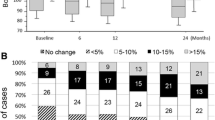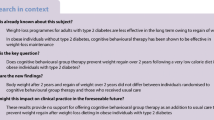Abstract
Objective: To describe and evaluate long-term efficacy (18 months from the end of treatment) of a new cognitive short-term weight reducing treatment program for obese patients. Subjects: One hundred and five obese [Body Mass Index (BMI) ≥30] patients participated in the study. Of these, 62 took part in the treatment program and 43 served as controls. Method: From an obesity unit’s waiting list, the patients were randomly assigned to either a treatment group or remained in the waiting list to serve as a control group. The treatment group participated in a 10-week (30 hours) cognitive group treatment program. All participants were weighed at the outset of the study, directly after treatment and at a 6-, 12- and 18-month post-treatment follow-up without any booster treatment after the 10-week program. Results: Fifty-seven (92%) patients completed treatment. For the 34 (60%) patients who participated in the study 18 months after treatment was terminated, the mean weight loss at treatment’s end was 8.5 kg (SD=16.1). Eighteen months later their mean weight loss was 10.4 kg (SD=10.8). The control patients (n=31, 72%) that participated in the study during the same period increased in weight by 2.3 kg (SD=7.0). The weight difference between the treatment and control group at the 18-month follow-up was highly significant (p<0.001). Conclusion: The cognitive group treatment program was highly acceptable among the participants and was completed by nearly all the patients. The 10-week treatment program resulted in satisfactory weight loss. The weight difference between the treatment group and controls was nearly the same at 18 monthts after end of treatment as at six months. The study, therefore, does not provide support for the contention that a lengthy therapy for obesity is necessary if treatment results are lasting.
Similar content being viewed by others
References
Liao K.L.: Cognitive-behavioural approaches and weight management: an overview. J.R. Soc. Promotion of Health., 120, 27–30, 2000.
Cooper Z., Fairburn C.G.: A new cognitive behavioural approach to the treatment of obesity. Behav. Res. Ther., 39, 499–511, 2001.
Agras W.S., Telch C.F., Arnow B., Eldredge K., Marnell M.: One-year follow-up of cognitive-behavioral therapy for obese individuals with binge eating disorder. J. Consult. Clin. Psychol., 65, 343–347, 1997.
Foreyt J.P., Poston W.S. 2nd.: What is the role of cognitive-behavior therapy in patient management? Obes. Res., 6, 18–22, 1998.
Perri M.G., Fuller P.R.: Success and failure in the treatment of obesity: Where do we go from here? Med. Exerc. Nutr. Health, 4, 255–272, 1995.
Foreyt J.P., Goodrick G.K.: Evidence for success of behavior modification in weight loss and control. Ann. Intern. Med., 119, 698–701, 1993.
Perri M.G.: Methods for maintaining weight loss. In: Brownell K.D. Fairburn C.G. (Eds.), Eating disorders and obesity: A comprehensive handbook. New York, Guilford Press, 1995, pp. 547–551.
Perri M.G., Nezy A.M., Viegener B.J.: Improving the long-term management of obesity: Theory, research, and clinical guidelines. New York, Wiley, 1992.
Perri M.G., Sears S.F., Clark J.E.: Strategies for improving maintenance of weight loss. Toward a continuous care model of obesity management. Diabetes Care, 16, 200–209, 1993.
Wadden T.A., Bell S.T. Obesity. In: Bellack A.S., Hersen M., Kazdin A (Eds.), International handbook of behavior modification and therapy. New York, Plenum Press, 1990, 2nd ed., pp. 449.
Wing R.R.: Behavioral treatment of severe obesity. Am. J. Clin. Nutr. 55., 545–551, 1992.
de Zwaan M.: Binge eating disorder and obesity. Int. J. Obes., 25,(Suppl. 1), 51–55, 2001.
Specker S., de Zwaan M., Raymond N., Mitchell J.: Psychopathology in subgroups of obese women with and without binge eating disorder. Compr. Psychiatry, 35, 185–190, 1994.
Yanowski S.Z., Nelson J.E., Dubbert B.K., Spitzer R.L.: Association of binge eating disorder and psychiatric comorbidity in obese subject. Am. J. Psychiatry, 150, 1472–1479, 1993.
Gormaly J., Blacks S., Daston S., Rardin D.: The assessment of binge eating severity among obese persons. Addict. Behav., 7, 47–55, 1982.
Vendetti E.M., Wing R.R., Jakicic J.J., Butler B.A., Marcus M.D.: Weight cycling, psychological health, and binge eating in obese women. J. Consult. Clin. Psychol., 64, 400–405, 1996.
Foreyt J.P., Goodrick G.K.: Attributes of successful approaches to weight loss and control. Appl. Prev. Psychol., 3, 209–215, 1994.
Foreyt J.P., Goodrick G.K.: Factors common to successful therapy for the obese patient. Med. Sci. Sports Exerc., 23, 292–297, 1991.
Foreyt J.P., Goodrick G.K.: Prediction in weight management outcome: Implications for practice. In: Allison D.B., Pi-Sunyer F.X. (Eds.), Obesity treatment. New York, Plenum Press, 1995, pp. 199–205.
Klem M.L., Wing R.R., McGuire M.T., Seagle H.M., Hill J.O.: A descriptive study of individuals successful at long-term maintenance of substantial weight loss. Am. J. Clin. Nutr., 66, 239–246, 1997.
Paulsen B.K., Lutz R.N., McReynolds W.T., Kohrs M.B.: Behavior therapy for weight control: long-term results of two programs with nutritionists and therapists. Am. J. Clin. Nutr., 29, 880–888, 1976.
Clinton D., Norring C.: The rating of anorexia and bulimia (RAB interview: development and preliminary validation). Eur. Eat. Disord. Rev., 7, 362–371, 1999.
American Psychiatric Association. Diagnostic and Statistical Manual of Mental Disorders, 4th ed.; DSM IV, American Psychiatric Association, 1994.
Stahre L.: Kognitiv behandling vid övervikt och hetsätning. (Cognitive treatment for obesity and binge eating). Lund, Studentlitteratur, 2002.
Björntorp P.: Visceral obesity: a “civilization syndrome”. Obesity Research., 1, 206–222, 1993.
Shively C.A., Laber-Laird K., Anton R.F.: Behavior and physiology of social stress and depression in female cynomolgus monkeys. Biol. Psychiatry, 41, 871–882, 1997.
Cuntz U., Leibbrand R., Ehrig C., Shaw R., Fichter M.M.: Predictors of posttreatment weight reduction after inpatient behavioral therapy. Int. J. Obes., 25, 99–101, 2001.
Sbrocco T., Nedegaard R.C., Stone J.M., Lewis E.L.: Behavioral choice treatment promotes continuing weight loss: preliminary results of cognitive-behavioral decision-based treatment for obesity. J. Consult. Clin. Psychol., 67, 260–266, 1999.
Garner D.M., Wooley S.C.: Confronting the failure of behavioral and dietary treatments for obesity. Clin. Psychol. Rev., 11, 729–780, 1991.
Rössner S.: Long-term intervention strategies in obesity treatment. Int. J. Obes. 19,(Suppl 7)., 29–33, 1995.
Andersson I., Rössner S.: Weight development, drop-out pattern and changes in obesity-related risk factors after two years treatment of obese men. Int. J. Obes., 21, 211–216, 1997.
Melchionda N., Besleghi L., Di Domizio S., Pasqui F., Nuccitelli C., Migliorini S., Baraldi L., Natale S., Manini R., Bellini M., Belsito C., Forlani G., Marchesini G.: Cognitive behavioural therapy for obesity: One-year follow-up in a clinical setting. Eat. Weight Disord., 8, 188–193, 2003.
Waller G.: Drop-out and failure to engage in individuals outpatient cognitive behavior therapy for bulimic disorders. Int. J. Eat. Disord., 22, 35–41, 1997.
Goldstein D.J.: Beneficial health effects of modest weight loss. Int. J. Obes., 16, 397–415, 1992.
Kanders B.S., Blackburn G.L.: Reducing primary risk factors by therapeutic weight loss. In: Wadden T.A., VanItallie T.B. (Eds), Treatment of seriously obese patients. New York, Guilford Press, 1992, pp. 213–230.
Wing R.R., Jeffery R.W.: Effect of modest weight loss on changes in cardiovascular risk factors: are there differences between men and women or between weight loss and maintenance? Int. J. Obes., 19, 67–73, 1995.
Tremblay A., Doucet E., Imbeault P., Mauriege P., Despres J.P., Richard D.: Metabolic fitness in active reduced-obese individals. Obes. Res., 7, 556–563, 1999.
Institute of Medicine. Weighing the Options: Criteria for Evaluating Weight-management Programs. Washington, DC, National Academy Press, 1995.
Royal College of Physicians Clinical Management of Overweight and Obese Patients. London, The Royal College of Physicians of London, 1998.
Ware J.H.: Interpreting incomplete data in studies of diet and weight loss: N Engl. J. Med., 21, 2136–2137, 2003.
Bruce B., Agras W.S.: Binge eating in females: A population-based investigation. Int. J. Eat. Disord., 12, 365–374, 1992.
Spitzer R.L., Devlin M., Walsh B. T., Hasin D., Wing R., Marcus M., Stunkard A., Wadden T., Yanovski S., Agras S., Mitchell J., Nonas C.: Binge eating disorders: A multi-site field trial of the diagnostic criteria. Int. J. Eat. Disord., 11, 191–203, 1992.
Wilfley D.E., Agras W.S., Telch C.F., Rossiter E.M., Schneider J.A., Cole A.G., Sifford L.A., Raeburn S.D.: Group cognitive-behavioral therapy and group interpersonal psychotherapy for the nonpurging bulimic individual: a controlled comparison. J. Consult. Clin. Psychol., 61, 296–305, 1993.
Gladis M.M., Wadden T.A., Vogt R., Foster G., Kuehnel R.H., Bartlett S.J.: Behavioral treatment of obese binge eaters: do they need different care? J. Psychosom. Res., 44, 375–384, 1998.
Author information
Authors and Affiliations
Corresponding author
Rights and permissions
About this article
Cite this article
Stahre, L., Hällström, T. A short-term cognitive group treatment program gives substantial weight reduction up to 18 months from the end of treatment. A randomized controlled trial. Eat Weight Disord 10, 51–58 (2005). https://doi.org/10.1007/BF03353419
Received:
Revised:
Published:
Issue Date:
DOI: https://doi.org/10.1007/BF03353419




